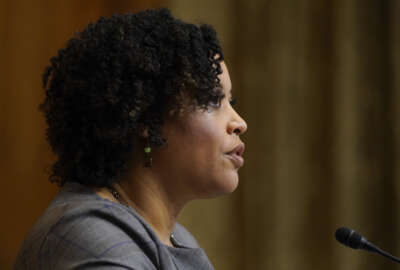
Will Congress ever return to the normal budget process? Whatever that is
Once they're past the extra spending bill that includes pandemic relief, Congress could start to regard the regular old budget - you know, the stuff that keeps ...
Best listening experience is on Chrome, Firefox or Safari. Subscribe to Federal Drive’s daily audio interviews on Apple Podcasts or PodcastOne.
Once they’re past the extra spending bill that includes pandemic relief, Congress could start to regard the regular old budget – you know, the stuff that keeps your agency going. Federal Drive with Tom Temin got the latest from Bloomberg Government Congress reporter Jack Fitzpatrick.
Interview transcript:
Tom Temin: Jack, good to have you back.
Jack Fitzpatrick: Yeah. Thanks for having me.
Tom Temin: So what is the outlook here this week in Congress, now that they have just about finished everything up that’s not regular?
Jack Fitzpatrick: Yeah, so there’s been so much focus on the not regular budget stuff. The House still has to pass the Senate amended stimulus package. So they’re wrapping that up. There’s a lot of discussion in Congress about what the next big thing will be. And for that reason, a lot of the focus on regular discretionary spending has kind of gone under the radar, there is a little bit of pressure to push that process to begin. There are Republicans in the House on the budget committee that were complaining to the White House, that they don’t even know when there is going to be a budget proposal. Usually an incoming administration is late with their budget proposal. But a lot of the time, in the past few administrations, we’ve at least gotten a skinny budget in the first couple months, and then they’ll send up full budget. We really haven’t heard when there’s going to be a budget proposal. They haven’t gotten to budget resolution talks to set the amount of money that they’re looking to spend in fiscal 2022. And then, of course, they have to do a lot of appropriations work. So later this year, I think is going to be very hectic and chaotic, because they’re off to a very, very slow start on the regular appropriations.
Tom Temin: And you’ve been covering, as a couple of other places have, the return of earmarks. Which went away, what about a decade ago, because of budget resolution ideas. Now we’re back to the old, old days, it seems like?
Jack Fitzpatrick: Yeah, there are going to be some sort of limited earmarks. They have placed more limits than were on them before, but they’ve been gone for 10 years. So it’s going to be interesting to see how they implement these new rules. One of the more important things at least for regular appropriations, when they bring these back, starting for fiscal 2022, is they’re putting a cap on them, that it can only be 1% of discretionary spending. So even if it ends up being something that might be seen as wasteful or unpopular, like some individual – you know, there are all these stories about the Bridge to Nowhere and anecdotal complaints about earmarks – they’re going to try to avoid that. But even if that is the case, it’s only 1% of discretionary spending. So depending on how they set the top line numbers, that’s looking like about $14 billion a year, maximum. They also exclude for-profit companies, this time in regular appropriations. It can go to grants to governments, and it can go to approved nonprofits. But that’s one way they’re trying to kind of clean things up in this new iteration. And say, members of Congress can request specific things, but it can’t go to for-profits, it can’t go to anything that is related to them or a family member. And they are putting a cap on how much they can actually spend. So it doesn’t feel way out of proportion.
Tom Temin: But it seems like there’s a giant loophole through that. For example, suppose I get my trolley line and you get your new clean water plant in Texas or something, some rural part that doesn’t have clean water, well, that money’s eventually going to go to a contractor to build that clean water plant or that choo-choo train.
Jack Fitzpatrick: Yeah, if it goes through state and local governments, there’s still work to do to track exactly where the money goes. There are some other new rules requiring a [Government Accountability Office] audit of a sampling of these, but there’s still going to be some pushback. And that’s why we’re actually not sure if Republicans are going to participate in this. These are the House Democratic rules for new earmarks. But there’s still this conflict in the House and Senate Republican conferences as to whether they’re going to submit earmarks because so many conservatives say you can have these new rules, but it’s still gonna lead to some bad stuff. So there are some political questions outlying.
Tom Temin: We’re speaking with Jack Fitzpatrick. He covers Congress for Bloomberg Government. And switching gears here, OMB, of course the original nomination of neera tanden has been withdrawn. She withdrew it and the president accepted that withdrawal. Now they’re hearing about Shalanda Young. What’s going on there, and there’s some Senate support for the idea of improving federal employee morale.
Jack Fitzpatrick: Yeah, so the whole conversation now is focusing on Shalanda Young even though she is not officially selected as the replacement for Neera Tanden, but there’s so much bipartisan support for her because she has a long history of working on the House Appropriations Committee and is very popular in Congress. Even before Tanden’s nomination got pulled a bunch of Republicans were saying we would support Shalanda Young just because they’ve dealt with her and struck bipartisan deals with her in the room. So yeah, we heard in one of her hearings on her nomination to be deputy director, which could get bumped up to full director, an exchange with her and Sen. Mark Warner from Virginia, talking at least generally about employee morale. She laid out generally what her vision is, in terms of saying federal employees have often been the ones to lose out in some of these deals, especially in the era of budget caps and sequesteration, which is going away – those budget caps that limited spending for a decade are no longer in place starting in fiscal 2022. They didn’t get way into specifics. But Young has clearly been popular with members of both parties, and at least in a nominal way, sort of stood up for federal workers, and in general, the federal workforce.
Tom Temin: And she doesn’t have a long streak of 10,000 tweets that insult everybody.
Jack Fitzpatrick: Yes, as somebody who covers appropriations and bugs staff all the time, I can say that Shalanda Young was purposefully very much a behind-the-scenes person, a quiet person who didn’t make public statements, and really was one of those people who would stay silent until everybody got in one of the back rooms, and she would work with members of both parties. So the White House has pointed out if she gets confirmed as deputy director, she would become acting director. So all those members would be happy, at least temporarily. And then the White House is still deciding if they would pick her or somebody else to be the actual nominee for director.
Tom Temin: And then there’s a big bill from Senator Cardin of Maryland with I think they’re good 25 Democratic senator co-sponsors that would do police reform at the federal level, including [Immigration and Customs Enforcement] and Border Patrol, but also it would, through grant control, enforce those standards at the local state police level. So what are the prospects there? And what are they trying to get done?
Jack Fitzpatrick: So that’s a measure that Ben Cardin has pushed for years that actually got folded into this broader George Floyd Justice In Policing Act. The Democrats brought up as a high priority and passed in the House. It’s hard to say exactly what the prospects would be for that and all these other police measures that Democrats support because it has largely been along partisan lines. And you look at how Democrats have gone in their early days with the House, Senate and White House, they’ve pushed this big stimulus bill through the budget reconciliation process. You can do budgetary measures, taxing and spending in a partisan way. But if you’re looking at policing, authorization, and those kinds of policing policies, that doesn’t appear to be something they could do in a partisan way, so the question is, could they get 10 Republican senators on board with that, and it’s a pretty tough one so that, you know, the Cardin measure to ban racial profiling at the federal level and then use grants to do similar things elsewhere, really, that depends on a legislative vehicle. And the legislative vehicle they chose so far doesn’t look like it has a lot of bipartisan support just yet.
Tom Temin: Jack Fitzpatrick is Congress reporter for Bloomberg Government. Thanks so much for joining me.
Jack Fitzpatrick:
Yeah. Thanks for having me.Tom Temin: We’ll post this interview at FederalNewsNetwork.com/FederalDrive. Hear the Federal Drive on demand. Subscribe at Apple Podcasts or wherever you get your shows.
Copyright © 2024 Federal News Network. All rights reserved. This website is not intended for users located within the European Economic Area.
Tom Temin is host of the Federal Drive and has been providing insight on federal technology and management issues for more than 30 years.
Follow @tteminWFED
Related Stories





